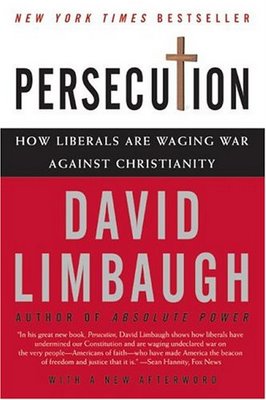

I read two wholly opposed books on holiday: American Theocracy, by Kevin Phillips, which argues that the United States is a) poised for a serious collapse in its relative power, and therefore b) drifting towards a religious-right fundamentalist government, with shades of fascism; and Persecution, by David Limbaugh, which argues that Christians are being driven out of American life and being forbidden to practice their faith.
Both books were decidedly mixed; I’m not sure I’d recommend either, but I found the experience of reading them sequentially quite valuable.
The Phillips book is a ragbag of condensed journalism, with occasional insights from his area of true expertise (psephology) – and he’s persuaded of Peak Oil as well, which marks him up 
One of the things which counts against Phillips (on b) above) is that it seems perfectly plausible that the US will react against the present Bush administration so strongly (when its incompetence is fully revealed) that it will swing the other way. Which brings me to Limbaugh. I am thoroughly persuaded of the overall argument that Limbaugh makes, ie that contemporary Western society (Anglo-American in the main) is becoming more aggressively anti-Christian. It’s a more salient issue in the US than in the UK, because the process has been much more thoroughly established in the UK, and the persistence of the Church of England has covered over the decay, but in the US the Christian community is still both vital and engaged. “What can the theistic Sunday-schools, meeting for an hour once a week, and teaching only a fraction of the children, do to stem the tide of a five-day program of humanistic teaching?” (he’s quoting Charles Potter).
However, Limbaugh’s understanding of Christianity itself is impoverished – he shares the general amnesia of the American church with regard to Christian tradition, and consequently he plays strongly into the hands of critics like Phillips. For example, he writes “Thus it is no mystery that Christianity is unacceptable to the post-modern paragons of tolerance. For the Christian worldview holds that the one and only God objectively intervened (and intervenes) in history and that its truth claims are absolutely valid and open to rational, empirical investigation. Aquinas, for one, would have no truck with that. (Interesting how even now the echoes of what Marsden described resound in the American debate.) And it is particularly difficult to take a writer seriously who begins one chapter (11) with the words “America is the greatest, freest nation in the history of the world.” That said, his chapter 11 I found to be the best of the book, talking about the theological underpinnings of the American democratic tradition, which I had suspected but never seen chapter and verse on. (Strangely enough, it was confirmed by a Guardian article that I read the next day – see here. The Guardian supports the views of the US religious right! Who disbelieves in miracles now?)
So, any conclusions? Principally confirmation of Strauss and Howe’s Fourth Turning thesis which predicted an increase in extremism through the next twenty years, reminiscent of Yeats: “The best lack all conviction, while the worst/ Are full of passionate intensity.” Beyond that, I remain concerned that the trials that the US are about to experience will provoke an extreme reaction, of a possibly fascist nature, which is Phillips’ thesis. Christians have flourished in times of persecution before, so I am much less afraid of what Limbaugh describes – the truth will out in the end. But a corruptly Christian fascism – that prospect is not negligible, and is profoundly alarming. As always, have a read of Chris Locke for more background on that.
